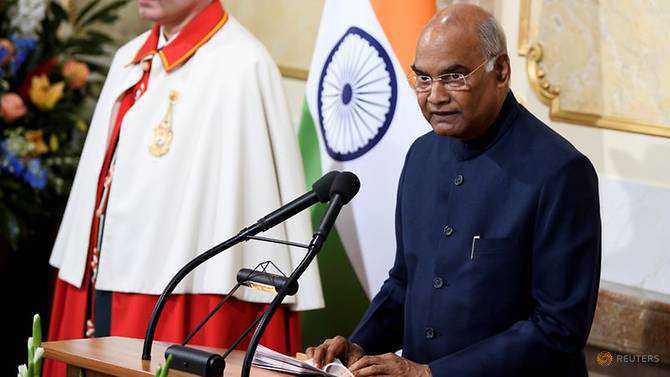Indian president disregards protests, signs citizenship Bill into law
14 December, 2019

A divisive citizenship Bill has been signed into law in India, a move that comes amid widespread protests in the country's northeast, forcing a visit by Japan Prime Minister Shinzo Abe to be cancelled.
Two people were killed and 11 injured on Thursday (Dec 12) when police opened fire on mobs in Assam state torching buildings and attacking railway stations. Protesters say the law would convert thousands of illegal immigrants into legal residents.
The new law lays out a path of Indian citizenship for six minority religious groups from the neighbouring countries of Bangladesh, Pakistan and Afghanistan.
Indian President Ram Nath Kovind gave his assent to the Bill late on Thursday, signing it into law, an official statement said.
A movement against immigrants from neighbouring Bangladesh has raged in Assam for decades.
Protesters say granting Indian nationality to more people will further strain the resources of the tea-growing state and lead to the marginalisation of indigenous communities.
MEETING CANCELLED
Prime Minister Narendra Modi has planned to host Abe at a meeting in Assam next week as part of a campaign to move high-profile diplomatic events outside Delhi to showcase India's diversity.
The summit originally planned for Dec 15 to Dec 17 is now cancelled.
Without saying why, India said that both sides had "decided to defer the visit", while Tokyo said the move followed "a report from the Indian side about the situation there".
Policemen detain a demonstrator during a protest after India's parliament passed Citizenship Amendment Bill (CAB), in Agartala, Dec 12, 2019. (Photo: REUTERS/Jayanta Dey)
Japan has stepped up infrastructure development work in Assam in recent years which the two sides were expected to highlight during the summit.
Abe had also planned to visit a memorial in the nearby state of Manipur where Japanese soldiers were killed during World War Two.
Critics of Modi's Hindu nationalist government say the bigger problem with the new law is that it is the first time India is using religion as a criterion for granting citizenship and that it excludes Muslims from its ambit.
The law seeks to grant Indian nationality to Buddhists, Christians, Hindus, Jains, Parsis and Sikhs who fled the three Muslim-majority neighbouring countries before 2015.
The Indian Union Muslim League party has petitioned the Supreme Court saying the law was in conflict with the secular principles of India's constitution that guaranteed equality to all without any regard to religion. No date has yet been set for the hearings.
The party said the law is "prima facie communal" and questioned the exclusion of minorities such as Rohingya Muslims who were just as persecuted as other faiths listed in the law.
The United Nations human rights office voiced concern on Friday that India's new citizenship law is "fundamentally discriminatory in nature" by excluding Muslims and called for it to be reviewed.
"We are concerned that India’s new Citizenship (Amendment) Act 2019 is fundamentally discriminatory in nature," UN human rights spokesman Jeremy Laurence told a Geneva news briefing.
The new law does not extend the same protection to Muslim migrants as to six other religious minorities fleeing persecution, thereby undermining India's commitment to equality before the law, enshrined in its constitution, he said.
"We understand the new law will be reviewed by the Supreme Court of India and hope it will consider carefully the compatibility of the law with India's international human rights obligations," Laurence said.
Source:
TAG(s):
